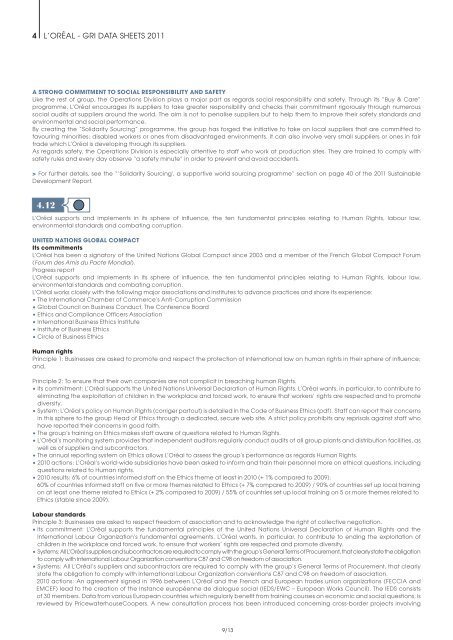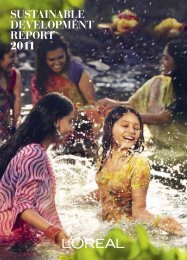Organizational Strategy - Sustainable Development - L'Oréal
Organizational Strategy - Sustainable Development - L'Oréal
Organizational Strategy - Sustainable Development - L'Oréal
You also want an ePaper? Increase the reach of your titles
YUMPU automatically turns print PDFs into web optimized ePapers that Google loves.
4 L’OréaL - GrI DaTa SHEETS 2011<br />
A STRONG COMMITMENT TO SOCIAL RESPONSIBILITY AND SAFETY<br />
Like the rest of group, the Operations Division plays a major part as regards social responsibility and safety. Through its “Buy & Care”<br />
programme, L’Oréal encourages its suppliers to take greater responsibility and checks their commitment rigorously through numerous<br />
social audits at suppliers around the world. The aim is not to penalise suppliers but to help them to improve their safety standards and<br />
environmental and social performance.<br />
By creating the “Solidarity Sourcing” programme, the group has forged the initiative to take on local suppliers that are committed to<br />
favouring minorities: disabled workers or ones from disadvantaged environments. It can also involve very small suppliers or ones in fair<br />
trade which L’Oréal is developing through its suppliers.<br />
as regards safety, the Operations Division is especially attentive to staff who work at production sites. They are trained to comply with<br />
safety rules and every day observe “a safety minute” in order to prevent and avoid accidents.<br />
> For further details, see the “‘Solidarity Sourcing’, a supportive world sourcing programme” section on page 40 of the 2011 <strong>Sustainable</strong><br />
<strong>Development</strong> report.<br />
4.12<br />
L’Oréal supports and implements in its sphere of influence, the ten fundamental principles relating to Human rights, labour law,<br />
environmental standards and combating corruption.<br />
UNITED NATIONS GLOBAL COMPACT<br />
Its commitments<br />
L’Oréal has been a signatory of the United Nations Global Compact since 2003 and a member of the French Global Compact Forum<br />
(Forum des Amis du Pacte Mondial).<br />
Progress report<br />
L’Oréal supports and implements in its sphere of influence, the ten fundamental principles relating to Human rights, labour law,<br />
environmental standards and combating corruption.<br />
L’Oréal works closely with the following major associations and institutes to advance practices and share its experience:<br />
• The International Chamber of Commerce’s anti-Corruption Commission<br />
• Global Council on Business Conduct, The Conference Board<br />
• Ethics and Compliance Officers association<br />
• International Business Ethics Institute<br />
• Institute of Business Ethics<br />
• Circle of Business Ethics<br />
Human rights<br />
Principle 1: Businesses are asked to promote and respect the protection of international law on human rights in their sphere of influence;<br />
and,<br />
Principle 2: To ensure that their own companies are not complicit in breaching human rights.<br />
• Its commitment: L’Oréal supports the United Nations Universal Declaration of Human rights. L’Oréal wants, in particular, to contribute to<br />
eliminating the exploitation of children in the workplace and forced work, to ensure that workers’ rights are respected and to promote<br />
diversity.<br />
• System: L’Oréal’s policy on Human rights (corriger partout) is detailed in the Code of Business Ethics (pdf). Staff can report their concerns<br />
in this sphere to the group Head of Ethics through a dedicated, secure web site. a strict policy prohibits any reprisals against staff who<br />
have reported their concerns in good faith.<br />
• The group’s training on Ethics makes staff aware of questions related to Human rights.<br />
• L’Oréal’s monitoring system provides that independent auditors regularly conduct audits of all group plants and distribution facilities, as<br />
well as of suppliers and subcontractors.<br />
• The annual reporting system on Ethics allows L’Oréal to assess the group’s performance as regards Human rights.<br />
• 2010 actions: L’Oréal’s world-wide subsidiaries have been asked to inform and train their personnel more on ethical questions, including<br />
questions related to Human rights.<br />
• 2010 results: 6% of countries informed staff on the Ethics theme at least in 2010 (+ 1% compared to 2009).<br />
60% of countries informed staff on five or more themes related to Ethics (+ 7% compared to 2009) / 90% of countries set up local training<br />
on at least one theme related to Ethics (+ 2% compared to 2009) / 55% of countries set up local training on 5 or more themes related to<br />
Ethics (stable since 2009).<br />
Labour standards<br />
Principle 3: Businesses are asked to respect freedom of association and to acknowledge the right of collective negotiation.<br />
• Its commitment: L’Oréal supports the fundamental principles of the United Nations Universal Declaration of Human rights and the<br />
International Labour Organization’s fundamental agreements. L’Oréal wants, in particular, to contribute to ending the exploitation of<br />
children in the workplace and forced work, to ensure that workers’ rights are respected and promote diversity.<br />
• Systems: all L’Oréal’s suppliers and subcontractors are required to comply with the group’s General Terms of Procurement, that clearly state the obligation<br />
to comply with International Labour Organization conventions C87 and C98 on freedom of association.<br />
• Systems: all L’Oréal’s suppliers and subcontractors are required to comply with the group’s General Terms of Procurement, that clearly<br />
state the obligation to comply with International Labour Organization conventions C87 and C98 on freedom of association.<br />
2010 actions: an agreement signed in 1996 between L’Oréal and the French and European trades union organizations (FECCIa and<br />
EMCEF) lead to the creation of the Instance européenne de dialogue social (IEDS/EWC – European Works Council). The IEDS consists<br />
of 30 members. Data from various European countries which regularly benefit from training courses on economic and social questions, is<br />
reviewed by PricewaterhouseCoopers. a new consultation process has been introduced concerning cross-border projects involving<br />
9/13






